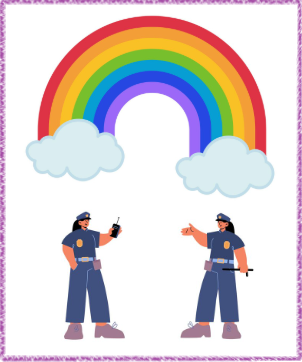Mu Conversations: A MAP-Law Enforcement Collaboration?

Dan Finkelstein
I fully appreciate this might feel like boiling the ocean, or even asking the Free Palestine movement to get into bed with the Directors of Raytheon, but here I would like to raise the possibility of a MAP Law-Enforcement Collaboration. If anything, as a conversation starter.
The precedents have always been strong. B4U-ACT, a collaboration between MAPs and clinicians has been going for almost a quarter of a century, and even successfully obtained state funding during its formative years under the late MAP thought-leader, Michael Melsheimer. By playing the long game, and thinking outside the box, MAPs managed to foster an identity and genuine, organic growth in ways previously unimaginable. It was an unprecedented success.
So, might there be a case for a project where MAPs collaborate with strictly-vetted LEOs?
Touching base: Concept development
To establish the deliverability of our MAP-LEO concept, and possible buy-in, let's brainstorm some potential goals:
1. Reverse-leverage the stigma
By combatting stigma (against both MAPs and LEOs) among the opposing group, we increase the net levels of understanding of MAP issues among professionals. We are not preaching, or playing the victim here, our goal is educative.
2. Prevent harms
Primary prevention of offending should be a major stated aim of our project. It is a statistical certainty, now that MAPs are in unvetted relationships with minors, whether platonic or socially inappropriate. And while there are disagreements in our community as to what qualifies as abuse, and where to draw the legal line, all of us have a shared interest in preventing the sexual abuse of children. So how can MAPs work with guardians of the law, to live their lives comfortably within it?
3. Paradigm-shift. Innovating with synergy
We will work towards shared content-moderation standards online. This is very important, as with modern federated social media, it is inevitable MAPs will be de facto content moderators within MAP spaces. A certification scheme could be set up for compliant projects.
4. Don't forget the low-hanging fruit!
As above, our initiative must be seen to be active in fostering good trust and safety governance in MAP communities. Systems must be put in place to detect and report extremism and support compassionate rehabilitation of suspected extremists. Trust between both MAPs and LEOs is very important here, and there are recent examples of extremism within MAP communities that could and should have been prevented.
Circling Back: Modelling our MAP-LEO collaboration
Models for the collaboration might be B4U-ACT itself, but also LGBT projects in police forces and the U=U campaign in HIV prevention. All of these were successful in increasing engagement and understanding from a previously low baseline.
There are also previous examples in which LEOs showed leniency towards MAPs, most famously in the Netherlands when an effective Age of Consent of 12 (with parental approval) operated for many years in the 90s. I have personally had direct contact with police liaison officers, who I believe would be open to this kind of idea if it were prefaced conservatively like B4U-ACT at its foundation.
While many MAPs have been subject to emotional trauma at the hands of LEOs (and understandably subscribe to the ACAB philosophy), the long-term pragmatics of the situation are as so:
We are the change-agent, and currently see LEOs as a roadblock. But our LEOs are here today, and will likely be here tomorrow, regardless of what the future holds for us. Some LEOs are also, shock-horror, MAPs themselves.
Building a strong relationship with LEOs might for all I know, be impossible in the present, but is likely to be inescapable in the future.
Fancy discussing this article, or leaving feedback? Why not share your opinion on MAP Forum?
